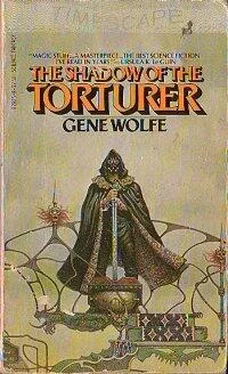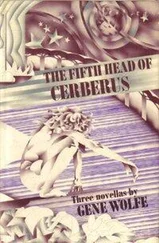“Of myself. Of what thoughts may return to me when I lie again with a man.
“Again? Do you remember a time before?”
Dorcas shook her head. “But I am certain I am no virgin. I have desired you often, yesterday and today. For whom did you believe I washed myself? Last night I held your hand while you slept, and I dreamed we sated ourselves and lay in each other’s arms. But I know satiety as well as desire—so I have known one man at least. Do you wish me to remove this before I blow out the candle?” She was slender, high-breasted and narrow-hipped, strangely childlike to me, though fully a woman. “You seem so small,” I said, and held her to me. “And you are so big.”
I knew then that however much I tried not to I would hurt her, that night and afterward. I knew too that I was incapable of sparing her. A moment before I would have refrained if she had asked. Now I could not; and just as I would have thrust forward though it had plunged my body on a spike, I would follow her later and try to cleave her to me.
But it was not my body that was impaled, but hers. We had been standing while I ran my hands over her and kissed her breasts, that were like round fruits sliced in two. Now I lifted her, and together we fell on one of the beds. She cried out, half in delight, half in pain, and pushed me away before she clutched at me. “I’m glad,” she said. “I’m so glad,” and bit me on the shoulder. Her body bent backward like a bow.
Later we pushed the beds together so we could lie side by side. Everything was slower the second time; she would not agree to a third. “You’ll need your strength tomorrow,” she said.
“Then you don’t care.”
“If we could have our way, no man would have to go roving or draw blood. But women did not make the world. All of you are torturers, one way or another.” It rained that night, so hard we could hear it drumming on the tiles over our heads, a cleansing, crashing, unending downpour of water. I dozed, and dreamed that the world had been turned upside down. Gyoll was overhead now, decanting all its flood of fish and filth and flowers over us. I saw the great face I had seen under the water when I had nearly drowned—a portent of coral and white seen in the sky, smiling with needle teeth.
Thrax is called the City of Windowless Rooms. This windowless room of ours, I thought, is a preparation for Thrax. Thrax will be like this. Or perhaps Dorcas and I are already there, it was not so far north as I thought, so far north as I was led to believe . .
Dorcas got up to go out, and I went with her, knowing it would not be safe for her to go alone at night in a place where there were so many soldiers. The corridor outside our room ran along an outer wall pierced with embrasures; water splashed through each in a fine spray. I wanted to keep Terminus Est in her sheath, but so large a sword is slow to draw. When we were back in our room again, with the table against the door, I took out the whetstone and sharpened the man-side of the blade, honing its edge until the endmost third, the part I would use, would divide a thread tossed into the air. Then I wiped and oiled the whole blade and stood the sword against the wall near my head. Tomorrow would be my first appearance on the scaffold, unless the chiliarch decided at the last moment to exercise clemency. That was always a possibility, always a risk. History shows that every age has some unquestioned neurosis, and Master Palaemon had taught me that clemency is ours, a way of saying that one less one is more than nothing, that since human law need not be self-consistent, justice need not be so either. There is a dialogue in the brown book somewhere between two mystes, in which one argues that culture was an outgrowth of the vision of the Increate as logical and just, bound by interior consistency to fulfill his promises and threats. If that was the case, I thought, surely we will perish now, and the invasion from the north, that so many have died to resist, is no more than the wind that topples a tree already rotten. Justice is a high thing, and that night, when I lay beside Dorcas listening to the rain, I was young, so that I desired high things only. That, I think, was why I so desired that our guild regain the position and regard it had once possessed. (And I still desired that, even then, when I had been cast out of it.) Perhaps it was for the same reason that the love of living things, which I had felt so strongly as a child, had declined until it was hardly more than a memory when I found poor Triskele bleeding outside the Bear Tower. Life, after all, is not a high thing, and in many ways is the reverse of purity. I am wise now, if not much older, and I know it is better to have all things, high and low, than to have the high only.
Unless the chiliarch decided, then, to grant clemency, tomorrow I would take Agilus’s life. No one can say what that means. The body is a colony of cells (I used to think of our oubliette when Master Palaemon said that). Divided into two major parts, it perishes. But there is no reason to mourn the destruction of a colony of cells: such a colony dies each time a loaf of bread goes into the oven. If a man is no more than such a colony, a man is nothing; but we know instinctively that a man is more. What happens, then, to that part that is more? It may be that it perishes as well, though more slowly. There are a great many haunted buildings, tunnels, and bridges; yet I have heard that in those cases in which the spirit is that of a human being and not an elemental, its appearances grow less and less frequent and at last cease. Historiographers say that in the remote past men knew only this one world of Urth, and had no fear of such beasts as were on it then, and traveled freely from this continent to the north; but no one has ever seen even the ghosts of such men.
It may be that it perishes at once—or that it wanders among the constellations. This Urth, surely, is less than a village in the immensity of the universe. And if a man lives in a village and his neighbors burn his house, he leaves the place if he does not die in it. But then we must ask how he came. Master Gurloes, who has performed a great many executions, used to say that only a fool worried about making some failure of ritual: slipping in the blood, or failing to perceive that the client wore a wig and attempting to lift the head by the hair. The greater dangers were a loss of nerve that would make one’s arms tremble and give an awkward blow and a feeling of vindictiveness that would transform the act of justice into mere revenge. Before I slept again, I tried to steel myself against both.
31. THE SHADOW OF THE TORTURER
It is a part of our office to stand uncloaked, masked, sword bared, upon the scaffold for a long time before the client is brought out. Some say this is to symbolize the unsleeping omnipresence of justice, but I believe the real reason is to give the crowd a focus, and the feeling that something is about to take place.
A crowd is not the sum of the individuals who compose it. Rather it is a species of animal, without language or real consciousness, born when they gather, dying when they depart. Before the Hall of Justice, a ring of dimarchi surrounded the scaffold with their lances, and the pistol their officer carried could, I suppose, have killed fifty or sixty before someone could snatch it ftom him and knock him to the cobblestones to die. Still it is better to have a focus, and some open symbol of power.
The people who had come to see the execution were by no means all, or even mostly, poor. The Sanguinary Field is near one of the better quarters of the city, and I saw plenty of red and yellow silk, and faces that had been washed with scented soap that morning. (Dorcas and I had splashed ourselves at the well in the courtyard.) Such people are much slower to violence than the poor, but once roused are far more dangerous because they are not accustomed to being overawed by force, and despite the demagogues, have a good deal more courage. And so I stood with my hands resting on the quillions of Terminus Est, and tumed this way and that, and adjusted the block so that my shadow would fall across it. The chiliarch was not visible, though I discovered later that he was watching from a win-dow. I looked for Agia in the crowd but could not find her; Dorcas was on the steps of the Hall of Justice, a position reserved for her at my request by the portreeve.
Читать дальше










